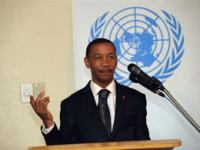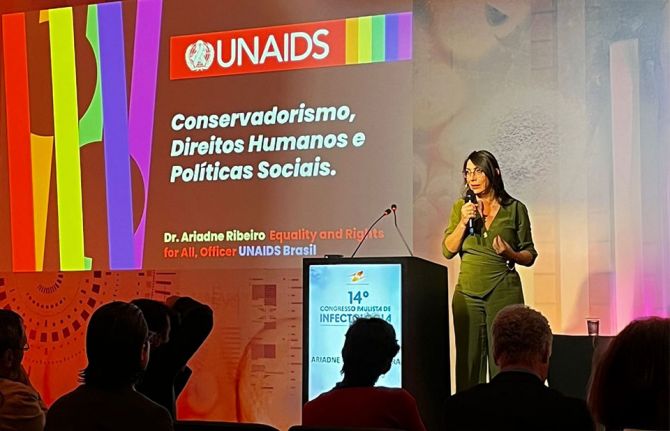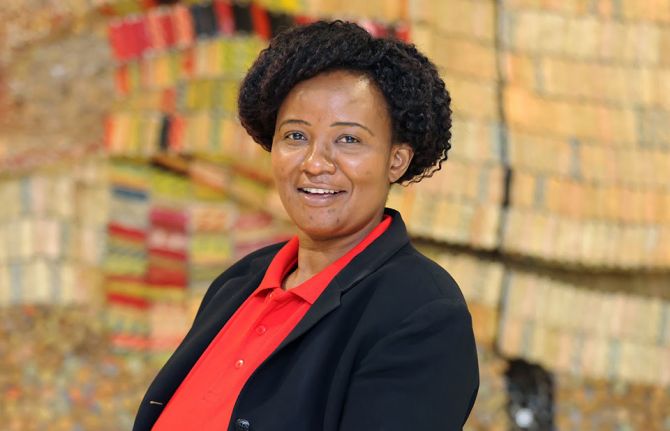
Feature Story
New UN Plus groups in South Africa and Lesotho
16 September 2009
16 September 2009 16 September 2009
Lawrence Makeleni, UN+ plus member in south Africa speaking at the UN+ launch in Pretoria.
Credit: UNAIDS/G.Williams
UN Plus, the advocacy group of United Nations staff members living with HIV, is launching three country groups in Southern Africa – Pretoria, Johannesburg and Lesotho - after an increase in membership of UN Plus in the region. UN Plus members are undertaking a road trip across southern Africa where they will later launch the ‘Friends of UN Plus’ initiative in Swaziland and Mozambique.
UN Plus was established in March 2005 and has full support from the UN Secretary–General Mr Ban Ki-Moon who has met with the group on several occasions. UN Plus brings together HIV positive staff working in the UN system from across regions and agencies. Its membership in the southern African region has doubled in the last year; this region now accounts for 42% of its 158 members. The road trip, which began on 14 September and culminates in Johannesburg on 25 September, celebrates this achievement. It includes visits to South Africa, Swaziland, Lesotho and Mozambique.
There is a strong need to provide hope and mobilise support to UN staff who are living with HIV and not open about their status.
Lawrence Makeleni, UN Plus member from South Africa.
Participating in the road trip are UN Plus Coordinator Bhatupe Mhango and UN Plus co-founder Manuel da Quinta. They are accompanied by Dan Maina, the UN Cares Regional Coordinator for Eastern and Southern Africa; Simphiwe Mabhele of the UN SA Wellness programme (International Labour Organizatin) and Lawrence Makeleni, a UN Plus member from South Africa.
Although membership has increased, UN Plus has observed that many UN staff are not open about their HIV status due to high stigma levels, among other factors, associated with HIV. The group, therefore, plans to launch a ‘Friends of UN Plus’ initiative in Swaziland and Mozambique this month as a forum through which the needs of UN staff members living with HIV and those caring for HIV-positive friends and family can be articulated and addressed.

UNICEF representative in South Africa during the launch of UN+ in Pretoria
Credit: UNAIDS/G.Williams
Lawrence Makeleni welcomed the initiative, saying, “There is a strong need to provide hope and mobilise support to UN staff who are living with HIV and not open about their status. Being the only staff living openly with HIV [in South Africa] I believe that advocacy and working together in an efficient and organised way will provide others the ability to be more open about HIV.”
The South Africa and Lesotho chapters of UN Plus follow similar launches in Malawi and Kenya. In 2007, its members had agreed to start UN Plus groups at country level if at least two or more members were active and at least one had openly disclosed their HIV status, although UN Plus does not force its members to declare their status outside the group. In accordance with this principle, there are at least three active members of UN Plus in South Africa and Lesotho.

Dr. Catherine Sozi, UCC south Africa pins the UN plus badge on the lapel of UNODC Representative in South Africa and Resident coordinator a.i. Mr. Jonhatan Lucas marking the official launch of UN+ in South Africa.
Credit: UNAIDS/G.Williams
With this launch, UN Plus aims to initiate dialogue on the rights of people living with HIV and highlight the work of the UN in providing such a platform. It also expects to get a more formal recognition of its activities and membership and ensure that UN staff members in the region are more sensitised and committed to providing an enabling environment with zero tolerance for stigma and discrimination against people living with HIV. UN Plus currently represents 28 agencies and 41 countries. The group offers an opportunity for members to share their experiences of positive living and survival skills, treatment, care and support, stigma and discrimination and other issues regarding HIV. It also monitors how well their specific work environments respond to the UN Personnel Policy on HIV and AIDS.
There are an estimated 5.7 million people living with HIV in South Africa. In Lesotho that number is close to 270,000, or 23.2% of its population.
New UN Plus groups in South Africa and Lesotho
Partners:
Feature stories:
UN Secretary-General meets HIV positive UN staff members (20 May 2009)
UN Secretary-General opens UNPlus exhibition (01 December 2007)
UN Plus meets UN Secretary-General at UN Headquarters in New York: photo gallery (20 May 2009)
External links:
Unplus on Facebook
Unplus on Twitter
Publications:
UNplus Position Papers on Stigma and Discrimination; Travel and Mobility; Confidentiality; Health Insurance March 2007 (pdf, 713Kb)
UNplus flyer (pdf, 425K)
Related
 Upholding dignity for everyone: Ariadne Ribeiro Ferreira
Upholding dignity for everyone: Ariadne Ribeiro Ferreira

21 November 2024
 Evelyn Siula: A journey of strength and solidarity
Evelyn Siula: A journey of strength and solidarity
18 November 2024
